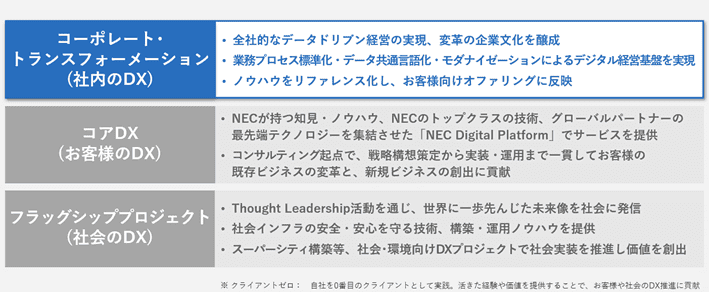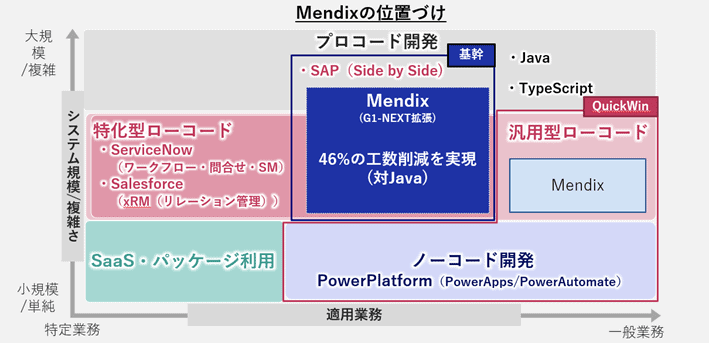NEC Promotes Digital Transformation and Generative AI with Mendix
Global information technology and electronics company, NEC Group, had a need to accelerate their internal digital transformation (DX) initiatives through agile development and generative AI.
NEC selected the Mendix low-code platform to support this initiative due to its scalability and extensibility as compared to other no-code products. Throughout their Mendix adoption, NEC has put an emphasis on:
- Establishing a Center of Excellence (CoE) to distill governance best practices.
- Training engineers to become productive Mendix developers in just a few weeks time.
- Leveraging low-code to harness the efficiency gains of Generative AI.
Mr. Kenji Yoshizawa, who has strengthened governance for app development as part of the low-code CoE within NEC, shared the analysis results and NEC’s current positioning of Mendix.
Positioning Digital Transformation at NEC
In its 2025 Mid-Term Management Plan, NEC aims for further growth by making “Internal DX,” “Customer DX,” and “Societal DX” the core of its management.
In “Internal DX,” NEC practices advanced internal DX based on the “Client Zero” concept—treating itself as the first client—promoting agile internal transformation quickly. The mission of NEC’s internal DX is to leverage the expertise and experience accumulated internally to benefit customers and society.

Differentiating Development Platforms
To accelerate its agile approach to “Internal DX,” NEC adopted the Mendix low-code development platform. This approach allows beginners to acquire low-code skills in a short time, aiming to achieve quick wins through initial small-scale successes.
“Our company was proficient in waterfall development, but to promote DX, it was necessary to quickly introduce agile development to achieve quick wins,” said Mr. Hiroki Tatsumi.
NEC is also working with no-code development but limits it to simple tasks due to limitations in scalability and functionality. On the other hand, while NEC has extensive expertise and many skilled engineers in programming languages like Java (pro-code development), it determined that pro-code is not the best solution for achieving quick wins.
“Additionally, Mendix supports extensions with languages like Java and JavaScript, making it easy to utilize existing knowledge and talent,” he added.
Currently, NEC uses multiple tools – such as ServiceNow, Microsoft Power Apps, Mendix, or Java – categorized by roles.

Based on this strategy, NEC leverages Mendix for:
- External app development in core systems like SAP (side-by-side).
- General-purpose low-code tools to achieve quick wins.
Using Mendix alongside SAP was a strategic choice based on many proven use cases and their longstanding global partnership. By introducing Mendix, development effort was reduced by 46% compared to traditional Java.
To prevent the proliferation of “rogue applications,” Mr. Yoshizawa established governance practices within the CoE to effectively manage their application portfolio. “There are no rogue applications in our company,” he stated.
Generative AI and Mendix
Following the release of ChatGPT, global attention has turned to Generative AI. NEC, with its long history of AI research and development, has been quick to launch initiatives like its internal Generative AI service.
By May 2023, NEC had released APIs for its Generative AI services, and in July, it announced its proprietary LLM. Currently, Mendix serves as the front-end application for accessing NEC’s LLMs. The use of Mendix shortened development from three months to just two weeks.
As a result, NEC has seen an impact in in both business and development processes:
- 50% reduction in document preparation time
- Meeting minutes reduced from 30 to 5 minutes
- 80% improvement in source code development efficiency